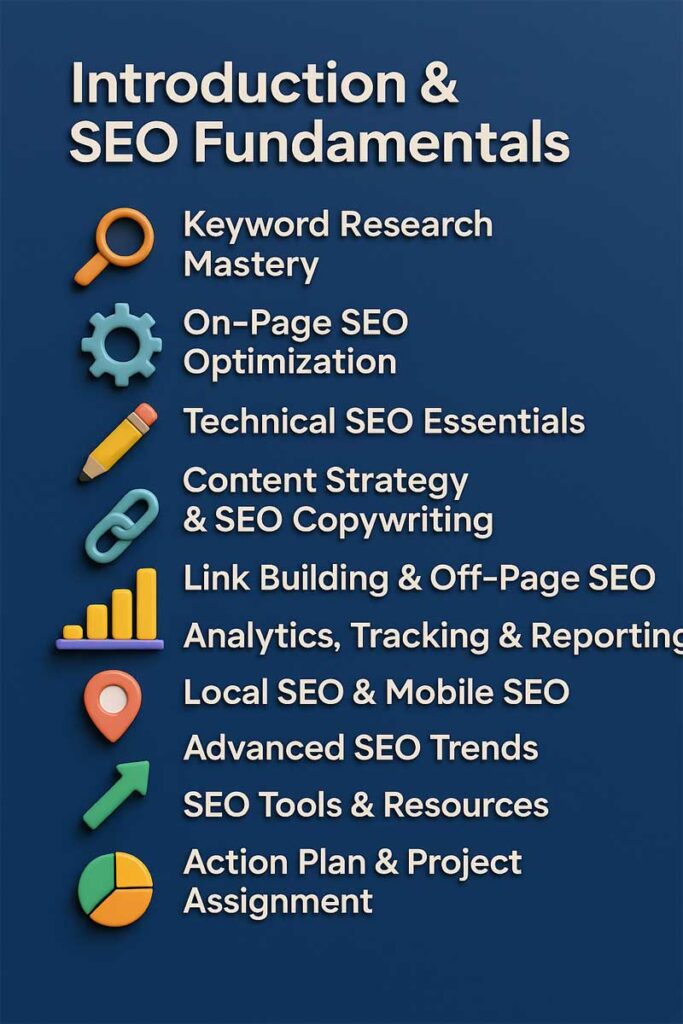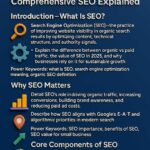SEO Tutorial Course Page
Introduction to SEO Tutorial
Welcome to the SEO Tutorial at small‑seo‑tool.com, your go‑to resource for mastering search engine optimization. Whether you’re a beginner or advanced user, this SEO training covers every essential aspect—from keyword strategy and on‑page SEO, to technical SEO, content optimization, and link building techniques.
Why This SEO Course Is Different
- Actionable Power SEO Keywords: Focus on real-world traffic-generators like “SEO tutorial”, “on‑page SEO guide”, “keyword research tool”, and “SEO analytics”.
- Hands-On Examples & Tools: Utilizes our own Small SEO Tool suite to reinforce learning.
- Structured Modules: Step-by-step progression from fundamentals to advanced strategy.
- Internal Backlinks: Seamless internal linking to related tools and blog posts on small‑seo‑tool.com for better user engagement and SEO boost. (e.g. Keyword Position Checker, Backlink Checker, SEO Audit Tool, SEO Blog).
What you will learn
- Introduction & SEO Fundamentals
- Keyword Research Mastery
- On‑Page SEO Optimization
- Technical SEO Essentials
- Content Strategy & SEO Copywriting
- Link Building & Off‑Page SEO
- Analytics, Tracking & Reporting
- Local SEO & Mobile SEO
- Advanced SEO Trends
- SEO Tools & Resources
- Action Plan & Project Assignment
- FAQs
Introduction & SEO Fundamentals
- Define SEO and its importance in 2025.
- Understand how search engines like Google crawl, index, and rank content.
- SEO Types: On-page, Off-page, and Technical.
- Why SEO matters for small businesses, blogs, e‑commerce, and local services.
Power Keywords: SEO tutorial, SEO strategy, search engine ranking, organic traffic growth
Keyword Research Mastery
Dive deep into keyword research fundamentals:
- Discover seed keywords and long-tail keywords that drive targeted traffic.
- Use tools like Keyword Suggestion Tool and Search Volume Checker.
- Competitive analysis: How to assess keyword difficulty and competitor keywords.
- Create a keyword map and content calendar.
Power Keywords: keyword research, long tail keywords, SEO keywords, keyword strategy, search volume
On‑Page SEO Optimization
Master the art of optimizing individual pages:
- Title tags, meta descriptions, header tags (H1, H2, H3), meta keywords.
- URL structure optimization and use of power keywords.
- Internal linking strategy: linking to your SEO Tutorial itself, SEO Audit Tool, and related content.
- Image optimization: alt text, file names, lazy loading.
- Content readability and SEO-friendly formatting.
Power Keywords: on-page SEO, meta tags, internal linking, image SEO
Technical SEO Essentials
Establish a solid technical foundation:
- Site speed optimization: caching, compression, minification.
- Mobile-friendly and responsive design best practices.
- XML sitemap, robots.txt, canonical tags.
- HTTPS, secure certificate, structured data (schema markup).
- Crawlability and indexing: fixing broken links, redirect strategy (301 vs 302), pagination.
Power Keywords: technical SEO, site speed, schema markup, mobile SEO, crawlability
Content Strategy & SEO Copywriting
Fuel your SEO with compelling content:
- Content planning: cluster topics, pillar pages, blog posts.
- SEO writing principles: keyword placement, LSI keywords, tf-idf.
- Writing meta descriptions and compelling CTAs.
- Update and refresh old content for SEO gains.
- Integrate multimedia: images, video, infographics.
Power Keywords: SEO content strategy, SEO copywriting, topic clusters, content optimization
Link Building & Off‑Page SEO
Amplify your site’s authority:
- What is domain authority and why backlinks matter.
- White-hat outreach strategies: guest posts, resource link building, broken link replacement.
- Tools: use our Backlink Checker to audit your backlinks.
- Track link equity via anchor text and linking domains.
- Social signals and brand mentions.
Power Keywords: link building, backlink audit, domain authority, guest blogging
Analytics, Tracking & Reporting
Measure and refine your SEO:
- Set up Google Search Console and Google Analytics (GA4).
- Track keyword rankings using the Rank Tracker Tool.
- Identify high‑impact opportunities via behavior flow, landing page performance.
- Build SEO dashboards and monthly reports.
- A/B testing meta tags, title tags, and CTAs.
Power Keywords: SEO analytics, GA4, search console, rank tracking, SEO reporting
Local SEO & Mobile SEO
Get found by local users:
- Google Business Profile optimization.
- Local keyword targeting and geo-modifiers (“near me”, city names).
- Building local citations and reviews.
- Mobile SEO: responsive design, viewport meta, tap targets.
- Voice search optimization.
Power Keywords: local SEO, mobile SEO, Google My Business, voice search, local search rankings
Advanced SEO Trends
Stay ahead with forward-thinking strategies:
- AI-generated content and GPT usage—ensuring quality and originality.
- E‑A‑T (Expertise, Authoritativeness, Trustworthiness) and core updates.
- Video SEO: optimizing YouTube descriptions, transcripts, thumbnails (find tool in blog).
- International SEO: hreflang, multilingual optimization.
- Zero-click SERPs, featured snippets, rich results.
Power Keywords: AI SEO, E‑A‑T, featured snippet optimization, video SEO, international SEO

SEO Tools & Resources
Enhance your workflow with tools:
- Use our suite: SEO Audit Tool, Keyword Suggestion Tool, Backlink Checker, Rank Tracker, Meta Tag Generator.
- Free vs paid SEO tools comparison.
- Blog post recommendations: check out our SEO Blog for case studies, tutorials, and updates.
Power Keywords: SEO tools, SEO audit, backlink checker, rank tracker
Action Plan & Project Assignment
Put your learning into practice:
- Select a business or blog niche.
- Conduct full keyword research.
- Optimize at least one page using on‑page and technical SEO techniques.
- Write or refresh content cluster around pillar topic.
- Build an outreach and link building plan.
- Track performance over 90 days and iterate.
By completing this project, students gain practical SEO skills and a live case study in real-world search engine visibility.
Frequently Asked Questions (FAQs)
Q1: How long does it take to see SEO results?
A: SEO timeline varies, but most beginner-friendly strategies show noticeable gains in 3–6 months, depending on competition and niche.
Q2: Is this SEO tutorial suitable for a beginner?
A: Absolutely—this course starts with fundamentals and gradually transitions to advanced tactics, covering foundational concepts and tools like SEO Tutorial Page.
Q3: What are “power keywords” and why are they important?
A: Power keywords are high-impact SEO phrases like “SEO tutorial”, “keyword research guide”—they drive targeted traffic and help rank pages.
Q4: How often should I update my content?
A: Refresh your content every 3–6 months to stay current, especially for evergreen topics.
Q5: Should I use free tools or premium SEO tools?
A: You can start with free tools (like ours). Premium tools offer deeper insights, but you can achieve excellent results with strategic free options.
Q6: How do I track if my SEO is working?
A: Use Google Search Console, GA4, and rank tracking tools like Rank Tracker to monitor clicks, impressions, rankings, and behavior.
SEO tutorial, SEO course, search engine optimization tutorial, SEO guide, on‑page SEO, off‑page SEO, technical SEO, keyword research, link building, SEO tools
Conclusion & Call to Action
Unlock the full potential of SEO by working through this systematic tutorial. Combine strong power keyword research, on‑page and technical optimization, effective content strategies, and ethical link building. Track your performance, adapt to new trends, and grow your organic traffic—step by step.
Ready to start?
👉 Jump in with the first module, use the powerful tools available on small‑seo‑tool.com, and start ranking!



